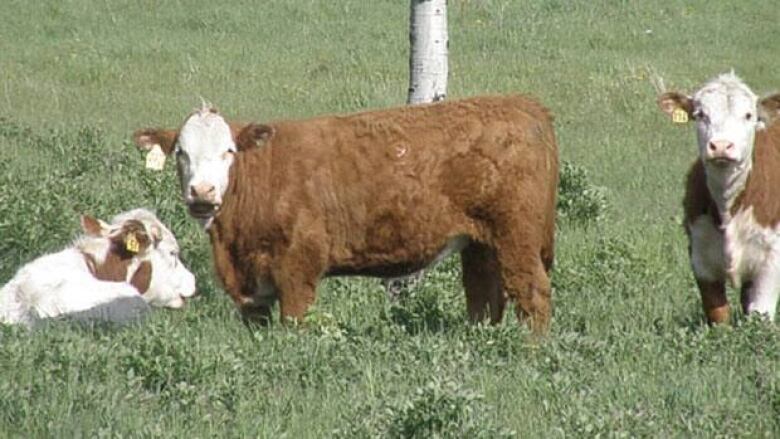Canada wins U.S. trade fight over meat labelling
WTO rules against U.S. country-of-origin labelling requirements

Canadian livestock producers celebrated victory Friday in a hard-fought battle over food labelling requirements imposed by the U.S. in 2008.
The federal governmentargued before the World Trade Organization thatAmerican "country of origin" labelling rules (COOL) actually worked to the detriment of the meat industry on both sides of the border by increasing costs, lowering processing efficiencyand otherwise distorting trade across the Canada-U.S. border.
Agriculture Minister Gerry Ritz and Trade Minister Ed Fast announced the WTO had ruled in Canada's favour at a news conferenceon aranch near Airdie, Alta. on Friday morning.
'We can now work with our American partners to turn this around and put our livestock industry back on a track to create more jobs and prosperity.' Ed Fast, Canadian trade minister
Ritz called the ruling a "clear win," and a "very vital first step on the road to recovery" after a difficult few years for the Canadianlivestock industry.
At the time the U.S. labelling rules came into force, the beef industrywas just starting to recover from its losses after the border was closedto beef cattlewhen a case of bovine spongiform encephalopathy (BSE) was discovered in Canada in 2003.
Prices in the pork industry were further strained by consumer panic over the 2009 H1N1 "swine flu" epidemic.
The agriculture minister said thatfrom 2008to 2009, Canadian feeder cattle exports declined a "staggering" 49 per cent. Slaughter hog exports also declined an "overwhelming" 58 per cent, the minister noted.
"As our economies continued to gather strength following the global recession, COOL was a step in the wrong direction," Fast said at the news conference.
"We can now work with our American partners to turn this around and put our livestock industry back on a track to create more jobs and prosperity."
Ruling applies to other commodities
In addition to cattle and hogs, the ruling applies to lambs, goats, chickens and other commoditiesthat were subject to the strict labelling regime in the U.S. It does not strike the entire labelling system, but applies only to the aspectsthat discriminate against Canadian agricultural commodities.
Mexico joined Canada in arguing the case at the WTO.
The livestock sector is heavily integrated across the Canada-U.S. border, with many live animals shipped from Canada to processing facilities in the U.S. for slaughter.
When COOL was implemented in 2008, processors had to segregate Canadian animals, process them only on clean or separate lines, and package and label the meat separately from that which came from an identical animal born in the U.S.
The additional costshurt primarilylivestock farmers in Canada.
"Some processors have simply refused to buy Canadian animals, while others are only willing to buy on certain days or at a deeply discounted price," Ritz noted, lamenting the decline in efficiency and increase in operating costs on both sides of the border under the American rules.
Some American meat packers and processors sided with Canada in the dispute, noting the negative impact on the integrated North American industry as a whole.
"This has been a long road for us in the industry," said Travis Toews, the president of the Canadian Cattlemen's Association. "We're extremely pleased."
Toews said that the COOL requirements costthe Canadian beef industry"hundreds of millions of dollars in reduced prices and increased transportation and handling costs." Canadian cattle prices declined by about$100 per animal.
"People and families have gone out of business solely because of this rule," said Jurgen Preugschas, the president of the Canadian Pork Council. "We have lost overfive million hogs as live exports into the U.S." he said, noting that Ontario and Manitoba producers were the most seriously affected.
"Those are families, those are homes, those are employees that have lost their jobs," Preugschas said.
U.S. may appeal
Although the ruling was unanimous on all points in the case, the Americans have 60 days to file an appeal.
WTO rulings do not assess compensation or penalties. Minister Ritz said that he hopes a negotiated settlement can be reached with the Americans to implement the decision.
During question period in the House of Commons on Friday, Liberal trade critic Wayne Easter suggested this dispute has cost livestock producers some $5 billion and called on the government to negotiate a compensation deal for farmers.
Ritz said the American decision to implement COOL had nothing to do with food safety. "It was more about making sure that the American supply of beef fed into their value chain before any outside systems did," the minister said, noting that Canada's beef industry is actually ahead of American producers in implementing systems to trace animals through to their final markets.
"A lot of commodities were caught beyond Canadian beef and pork," Ritz said. "We're collateral damage."
As a consequence of this trade dispute with the U.S., both ministersnoted Canada's recent efforts to diversify markets for Canadian meats around the world, particularly in Asia.
"We have learned some lessons that too many eggs in one basket are not always good," Ritz said.












_(720p).jpg)


 OFFICIAL HD MUSIC VIDEO.jpg)
.jpg)



























































































